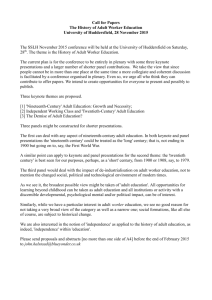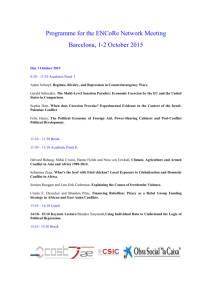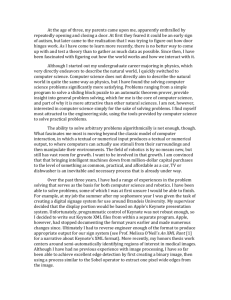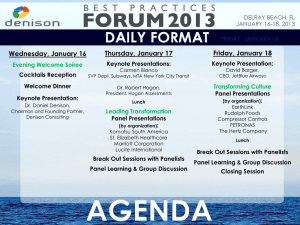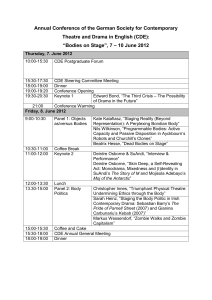Taking a population health approach to mental health and wellbeing
advertisement
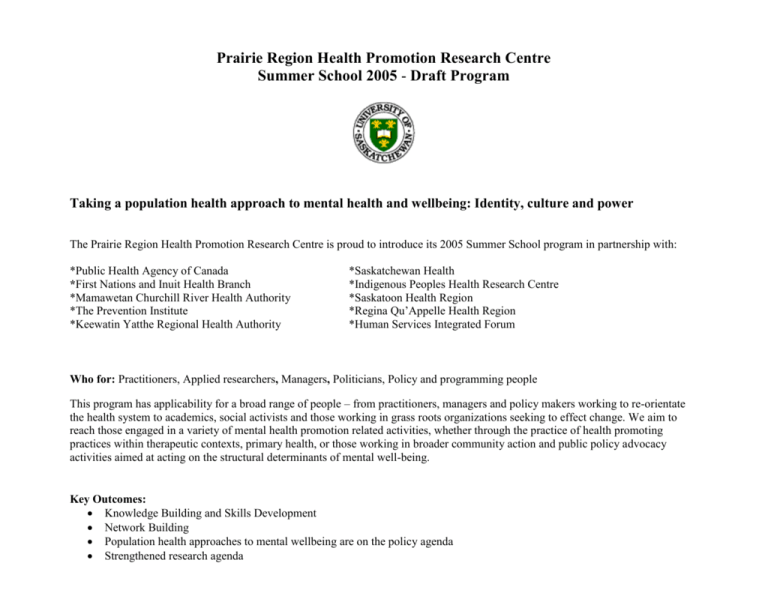
Prairie Region Health Promotion Research Centre Summer School 2005 - Draft Program Taking a population health approach to mental health and wellbeing: Identity, culture and power The Prairie Region Health Promotion Research Centre is proud to introduce its 2005 Summer School program in partnership with: *Public Health Agency of Canada *First Nations and Inuit Health Branch *Mamawetan Churchill River Health Authority *The Prevention Institute *Keewatin Yatthe Regional Health Authority *Saskatchewan Health *Indigenous Peoples Health Research Centre *Saskatoon Health Region *Regina Qu’Appelle Health Region *Human Services Integrated Forum Who for: Practitioners, Applied researchers, Managers, Politicians, Policy and programming people This program has applicability for a broad range of people – from practitioners, managers and policy makers working to re-orientate the health system to academics, social activists and those working in grass roots organizations seeking to effect change. We aim to reach those engaged in a variety of mental health promotion related activities, whether through the practice of health promoting practices within therapeutic contexts, primary health, or those working in broader community action and public policy advocacy activities aimed at acting on the structural determinants of mental well-being. Key Outcomes: Knowledge Building and Skills Development Network Building Population health approaches to mental wellbeing are on the policy agenda Strengthened research agenda Learning Objectives: Participants will have a clear understanding of the conceptual terrain of mental health promotion (MHP), including underlying knowledge systems, key concepts and approaches. Participants will understand the relationships between identity, culture, power and mental well-being from a variety of cultural perspectives. Participants will gain understanding of how colonization and current health- policies shape health contexts and programming approaches. Participants will gain understanding of Aboriginal and Indigenous well-being concepts Participants will be able to identify where their work sits on the continuum of approaches to mental well-being (Treatment, Prevention, Promotion and Development) and the potential resulting level of change. Participants will be able to critically evaluate MHP interventions according to key criteria such as underpinning concepts, principles of community engagement, use of power, practitioner role, and evaluation. Participants will gain mutual understanding of the key policy, organizational and practitioner factors influencing the implementation (i.e., barriers, enablers) of MHP programs. Program Structure The program seeks to provide a range of learning forums for participants with the intent of combining ‘exposure to ideas’ with opportunities for their ‘application in practice’. Keynote speeches at the beginning of each day are designed to expose all participants to broad principles and mental health promotion concepts. Sub plenary and workshop streams provide opportunity to explore selected areas of interest and begin to apply key concepts within particular practice settings of relevance to participants. Learning groups at the end of each day extend this process, providing participants with the opportunity to further explore and digest key concepts from the day within the comfort of a home base learning group. These facilitated learning groups will also provide the Summer School organizers with an important feedback mechanism re participants’ experiences of the program, knowledge distilled and any unmet learning needs. The program aims to be participatory, drawing on principles of adult education and participants’ knowledge. Key ideas linking program streams The program streams are purposively developed and sequenced to complement each other with respect to content and range of learning opportunities. They are underpinned by four main concepts or themes: self-determination, ethical space, power-culture and equity. These form the corner stones of the program, appearing in different ways throughout the sessions and linking these together. Self-determination refers to the ability of individuals and communities to determine their own future or live lives they have reason to value, and is equated with mental health and well-being. The concept of Ethical Space distinguishes between Aboriginal and Western knowledge systems and the relative influence each of these has on current mental health promotion approaches. Power-culture refers to the various combinations of power-culture dynamics that influence self-determination or mental well-being, the interplay between knowledge systems within service delivery and the ways in which MHP practitioners approach their work. Culture is interpreted broadly here to include factors such as ethnicity, gender, class, sexuality, ability and age for examples. Equity refers to the need for MHP interventions to address underlying determinants of health aimed at economic, social, cultural and political equity. Theory Tuesday, August 16 Monday, August 15 8:30 10.00 11:00 Registration available until 1 pm 1:00 Welcome 11:00 12:00 1:00 Keynote #3: Willie Ermine “Ethical Space and Aboriginal / Western Knowledge Systems” Practice Wednesday, August 17 8:30 9.30 Keynote#4: Globalization, power, culture and equity Key note #5: Thinking critically about how constructs shape practice approaches: Caroline Tait Praxis Thursday, August 18 8:30 Key note #6: Unpacking Mental Health Promotion Panel Discussion 2: Expanding Our Understanding of Culture: Sexuality and Mental Health: GLBT Centre, Panel Discussion 3: Putting It All Together: Policy, Programming and Practice 11:00am: Workshops (8) “Putting It All Together” Open Discussion With Ovide, Willie and KN # 4 Lunch Panel Discussion 1 “Equity” 10.45 Workshop Streams Levels of change 11:00 12:00 1:00 Lunch Best Practices: #1. Addictions: A Northern Perspective: Elaine Malbeuf # 2. Mental Health Promotion in the Workplace: Judith Martin 12:00 12:15 Nutrition Break Closing Plenary: Weaving the Threads Celebration Lunch and Farewells Opening keynote Lewis Williams Mapping the conceptual terrain, asking the difficult questions, introducing the program Drama / dance troupe 3:00 Break 2:15 Break 3:00 Break 1:00 3:30 Workshops: Introduction “Broadening our understanding of HP”; Concepts of HP; How is HP practiced in your workplace Formal Banquet Keynote #2: Ovide Mercedi 3:00 Workshop Streams (#12) Health promotion contexts (see **) 3:15 Workshop Streams Developing Critical Skills in planning Mental Health Promotion Initiatives (see **) ****Workshop Streams Wed am Home time! 7:00 6:30 5.00 Evening Entertainment Rural Mental Health Addictions Environmental Impacts Workplace Health Promotion Recreation and Mental Health Nutrition: Links to Mental Health Social Support Systems Physical Well Being and Illness Youth Intra and Extra Familial Violence Northern Mental Health Mentally Healthy Lifestyles: Holistic DAY ONE Opening Key Note: The opening key note by Lewis Williams, maps the current issues and conceptual terrain of MHP, highlights the difficult questions we are faced with and provides and overview of the program. It introduces the concept of power-culture, the various dynamics of power and culture occurring from context to context that influence mental well-being and self-determination. Learning Groups: Participants will have an opportunity to network and share information and ideas. This first learning group will allow facilitators to introduce the purpose of the groups. Participants will have the opportunity to discuss individual concepts of health promotion as well as to explore the ways in which health promotion is practiced within their workplace and community. Keynote #2: Ovide Mercredi establishes how colonial relations have and continue to shape mental health contexts for aboriginal peoples. This presentation and dinner will be open to the public. DAY TW Keynote #3: Willie Ermine introduces the concept of ethical space, distinguishing between Aboriginal and Western knowledge systems and the relative influence each of these has on current mental health promotion approaches. Keynote #4: Equity as a key mental health determinant. This keynote discusses equity as a key mental health determinant using the example of poverty. Its discussion of wealth and health inequities connects material inequities between people to experiences of power and powerlessness; therefore making the link between subjectivity and more concrete mental health determinants such as income, housing quality and food security. Workshop streams: These workshops are designed to give participants the opportunity to explore more in-depth how the concepts of de-colonization, ethical space and equity may be applied to their work. Panel Presentation 1: Globalization, power-culture and identity formation: Indigenous and migrant identities. This panel presentation makes the connection between historical and contemporary globalizing processes and identity formation specifically as this relates to Indigenous and migrant peoples in Canada. Dynamics of power and culture are shown to shape identity formation through the influence of structural factors on community settings and family relations. Workshop streams: Afternoon workshops streams give participants the opportunity to explore more in-depth how the concepts identity formation and power-culture may be applied to their work with Indigenous, migrant and other cultural communities. Learning groups: The focus of day two’s learning groups will be debriefing and integration of materials that have been presented thus far. At this point, participants are encouraged to provide feedback regarding the proceeding. DAY THREE Keynote #5: Thinking critically about how constructs shape practice approaches: Caroline Tait Keynote #6: Unpacking mental health promotion. This keynote provides discussion on the variety of determinants that shape mental health contexts, outlines key mental health promotion approaches in relation to a change continuum and introduces evaluation Workshop streams: Workshop streams will give people the opportunity to apply ‘Unpacking mental health promotion’ to their own particular area of interest. The streams will be divided into the following topics: rural mental health; addictions; environmental impacts; workplace health promotion; recreation and mental health; nutrition and its links to mental health; social support systems physical health and illness; youth; intra and extra familial violence; northern mental health; and mentally healthy lifestyles: a holistic approach. Examples of Best Practice: Three examples of best practice at the individual, community and structural levels of change will be profiled. These will focus on a variety of practice areas including northern perspectives; mental health promotion in the workplace and environmental health promotion and its impact on mental health. Workshop streams: The focus of these workshops is for participants to develop the skills to critically evaluate mental health promotion interventions, policies and programs. DAY FOUR Panel presentation #2: Expanding our understanding of culture: sexuality, gender and mental health. This presentation aims to broaden participants understanding of the application of the ‘culture’ to mental health promotion related activities, using the examples of ‘queer’ and ‘gender’ cultures. An introduction and synthesis of the panel will help participants to integrate ideas and concepts presented. Panel presentation #3: Putting it all together: Policy, programming and practice. This panel presentation and discussion presents contemporary issues and challenges of doing mental health promotion work in current healthcare systems through mapping the interfaces and tensions between policy, programming and practice. Workshops: “Putting it all together”. These workshops provide opportunity for mixed groups of practitioners, applied researches, managers and policy makers to discuss ways forward through the issues outlined in the previous panel presentation. In particular they will aim to inform the mental health promotion research agenda. Final Plenary: “Weaving the threads” The final plenary provides commentary from cultural and organizational perspectives on the emergent summer school threads and themes.
